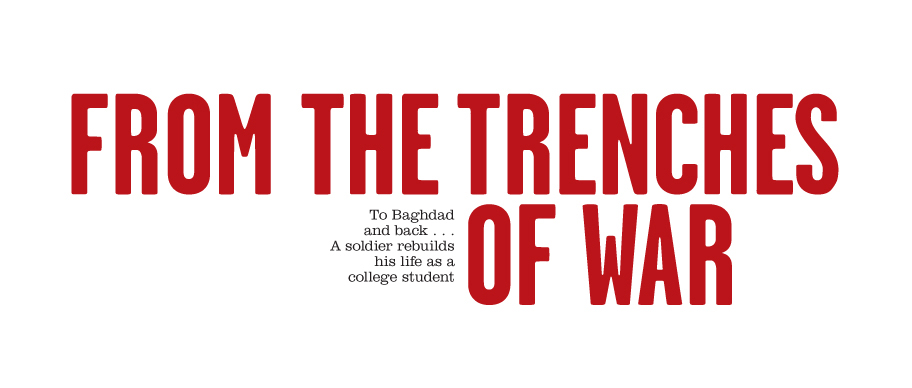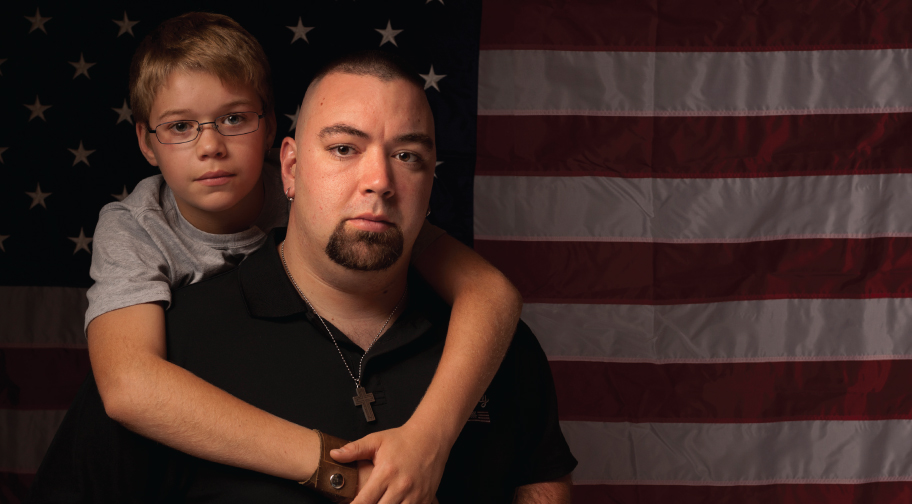



Tony Doyle has been to Baghdad and back. He’s been under fire, pinned beneath a toppled Humvee and medicated with morphine to numb the pain of a mangled left leg. He’s been through amputation and post-traumatic stress disorder, through traumatic brain injury and a diagnosis of attention deficit hyperactivity disorder, and through a divorce.
And now? Now he’s sitting in a wheelchair at his living room table, two earrings in his left lobe, tattoos up one arm and down his remaining leg, and talking about the good life, about a new life. College student.
A 31-year-old veteran of the Iraq War, Doyle is pursuing a history degree at UTSA. At first, he wanted a bachelor’s to teach high school. But then his dream got bigger. “I want to go all the way up to the Ph.D. level,” he said. “I want to be a college professor.”
In one respect, Doyle is the face of the nontraditional college student. But he also represents a surging trend. From 2007 to 2009, the number of freshmen receiving veteran educational benefits at UTSA increased more than 100 percent. In 2011, there were 2,690 student veterans and their dependents receiving educational benefits, a 65 percent increase from 2009. University officials expect the growth to continue.
One reason: UTSA provides an impressive range of services for student veterans, from counseling for war-related issues to assistance with employment. The university also helps with securing military benefits. But there’s another reason for the high numbers—the university recruits from local military installations.
“We are doing outreach to veterans because we feel we have a lot to offer them at UTSA,” said Lisa Firmin, associate provost for faculty and student diversity. “I think we are establishing ourselves as a military-friendly school.”
With these students come unique challenges. Doyle, a junior who hopes to graduate in December 2012, brings the benefit of financial aid from the U.S. Army, the experience of world travel (he has served in South Korea and Iraq), the perspective of fatherhood (he has four children) and the wisdom of age. But then there is the PTSD. The traumatic brain injury. The ADHD.
“It’s very, very difficult, especially when it comes to pursuing a degree in history,” Doyle said. “There is so much you have to read, so much you have to write.”
One challenge, he explains, centers on written expression: the process of forming ideas, turning them into words and putting them on paper without his mind wandering. In one sense, that’s classic ADHD. But Doyle’s struggle is compounded by the brain injury suffered during a bomb blast. The symptoms: memory loss, poor concentration, slow information processing.
“So I guess that makes me a computer from the ’90s,” he said, smiling. “My sense of humor was not at all affected.”
The slightest thing can distract Doyle from studying. A bug on the floor. A random thought. Frequent distractions occur when Doyle and his wife, Melissa, speak.
Doyle’s mind can be a pinball machine, thoughts bouncing here, ricocheting there, careening everywhere. But he finds a way to harness them, redirect them, bring them into order. He may take twice as long to write a paper as his wife, an online student at the University of Arkansas at Little Rock, but the result, she said, is twice as good.
“His writing is exceptional,” Melissa Doyle said.
Once a C and D high school student in Jacksonville, Ill., Doyle carries a 3.3 GPA at UTSA. He made the President’s List over the summer with a 4.0.
“That’s not surprising,” said Will Dawson, a veteran of the Army and a UTSA graduate student who is president of the university’s Student Veterans Association. “A lot of veterans do better at the university than they did in high school. They are focused on a goal. And quite frankly, that goal is to go back into the civilian world and put themselves in a better position than they were in before. I just barely made it through high school with a 2.2 grade point average. I graduated from UTSA with a 3.9.”
Success in the classroom has enhanced Doyle’s outlook. “He’s always in bright spirits,” said Michael Huebner, a 33-year-old business management major and veteran who suffered a serious knee injury in Afghanistan. “He’s a role model, a big inspiration. I’m a disabled veteran but not to the extent he is. I’m not sure I’d be as positive if I were in his situation.”
Doyle’s wife is another reason for his optimism. They met in a sports bar in North Little Rock, Ark., in 2005. She was a waitress; he was a patron from Camp Robinson across the street. Doyle stopped in every day for two weeks. Romance blossomed. “It was a fairy-tale relationship,” Melissa Doyle said.
They began talking marriage after Doyle left for Fort Stewart, Ga., the largest Army installation east of the Mississippi River. From Fort Stewart, he went to Kuwait. A tour in Iraq began in June 2005. His duties included working a “presence patrol” on the outskirts of Baghdad. In a Humvee, he rode through the streets to deter insurgent activity.
Danger lurked on the road. The enemy often hid improvised explosive devices in unexpected places. In the carcass of an animal, for example. Or inside an empty can.
On the morning of Aug. 9, 2005, Doyle rode in patrol in the lead vehicle. A soldier in his Humvee spotted a suspicious object beside the road and yelled, “Look out! Look out!”
An explosion followed. The Humvee flipped. The door latch broke in the rollover. Doyle lost consciousness and was ejected. The Humvee landed on his left leg, pinning him to the ground. He awoke a short time later to excruciating pain.
“I would say the adrenaline was pumping at the max,” he said. “The first thing I did was look for my weapon.”
He noticed fellow soldiers setting up a 360-degree perimeter with Bradley Fighting Vehicles. The show of force calmed him a bit.
“I saw the doc heading for me so I pulled out a smoke, put it in my mouth and prepared to light it,” he said. “When the doc got to me, he slapped it out and proceeded to tell me I could not have it because he was going to give me morphine.
“He got to work digging a space under my leg and the Humvee to put a tourniquet on to stop the bleeding. As he was doing that, some other guys were digging near my leg to help relieve some of the pressure. At one point, they stopped digging.”
One soldier asked, “Why did you stop?”
The reply: “We can’t tell what’s his leg and what’s the ground.”
The IED had detonated between the vehicles. Only one soldier was injured: Doyle. The single blast was all the enemy delivered that morning. “I never looked at my leg,” he said, “because I knew if I did it would throw me into shock, which kills just as easy as a bomb.”
Forty-five minutes after the explosion, a medevac helicopter arrived to carry Doyle to a hospital in Balad, almost 50 miles away. “I do not know why,” he said, “but as I was being loaded onto the medevac, I gave a thumbs up, as if I had been injured on a football field.”
He awoke in a recovery tent. The only other person in sight was a nurse on desk duty. “I looked around and realized my left leg was gone,” he said. “I am not sure how to explain that feeling except for very lonely. It was the most horrible feeling I have ever had. I got the nurse’s attention and tried to figure out what was going on. Was I dreaming or not? I wasn’t. It was all true.”
By the time he called his girlfriend to tell her the news, she already knew. An officer had explained the amputation simply: “The leg was mangled, like a crushed piece of paper.”
Sgt. Doyle came home sooner than expected. He and Melissa married in 2006 and blended two families. He has two children from a previous marriage; she has one. Together, they have an infant.
He started thinking about college two years into the marriage. While dining with his wife at a Japanese restaurant, Doyle struck up a conversation with an architect.
“You go to school and complete your degree in drafting and design,” the architect said, “and I’ll have a job waiting for you.”
The idea ended quickly. Doyle took a computer drafting course online at Pulasky Technical College and struggled. “It wasn’t working well for me in the memory department,” he said.
He completed two years of general education. After deciding to pursue history, Doyle enrolled at UTSA in spring 2011 on the recommendation of a friend from church. And he’s found his passion.
The passion comes, in part, from his love for history, and from having participated in a major historical event—the Iraq War. “What really drives me to study,” he said, “is I see a lot of history repeating itself.”
He also is driven to please an agriculture teacher from high school, Jim Rahe, a man who became a close mentor after Doyle’s mother died. “He kicked my butt to get me through school,” Doyle said. “He was always telling me, ‘You can do better than this. There’s no reason you should be a below-average student.”
They remain close. Rahe and his wife attended Doyle’s wedding. When Doyle returns to Illinois, he and Melissa visit Rahe’s family. “I didn’t believe I could change myself for the better,” Doyle said. “He did. Proving his point is another big motivation.”
It’s a long way from Jacksonville, Ill., a long way from Baghdad. Doyle entered the military right after high school in 1999 and served seven and a half years. The military now pays for his schooling. It pays for his medical and living expenses.
“Sometimes I wish things had gone differently,” he said, “but I think about how much more time I have with family. Things did not turn out badly. I can be home more and not worry about having to deploy.”
If not for the military and his tours abroad, it’s not likely Doyle would be in college, working to become a professor. He hopes to instill in his students a love of history, to impart more than facts from a text.
He also wants to open his life like a book and reveal his firsthand experience from the trenches of war.
–K. Rodriguez